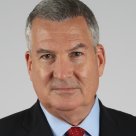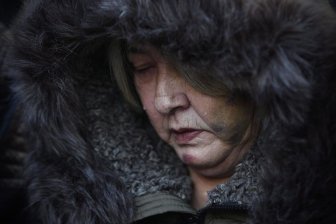The top bureaucrat at Global Affairs Canada urged Foreign Minister Chrystia Freeland last summer to champion freedom of expression at the United Nations Human Rights Council — yet also cautioned that too firm a push could threaten Canada’s campaign to win a seat on the UN Security Council.

The memo, written last July but just recently obtained by Global News via a federal access-to-information request, illustrates how Canada, as a middle power, has to carefully negotiate its way in international forums to advance its own agenda. In this case, the tradeoff outlined in the memo appears clear: put too much pressure on countries that do not share Canadian values of free speech and those countries may not support Canada for the security council seat.
The memo was written last July by Ian Shugart, then the deputy minister for foreign affairs. Shugart has since been promoted and is now the Clerk of the Privy Council.
READ MORE: U.S. retreat from U.N. Human Rights Council is ‘bad news,’ council members say (from June 2018)
The Trump administration had just pulled the United States out of the United Nations Human Rights Council (UNHRC), based in Geneva, Switzerland. Shugart notes that American diplomats to the UNHRC had devoted significant energy and resources to get the council to investigate and address human rights violations.
Members of the UNHRC are elected by the UN general assembly for a period of three years. While Canada is currently not a member of the UNHRC, current members include some of the world’s worst human rights abusers such as Pakistan, Saudi Arabia, China, and Cuba.
WATCH: Amal Clooney speaks about media freedom and democracy at G7 summit

With the U.S. departure from the council, Shugart saw an opening for Canada.
But, Shugart also warned of “a degree of political risk” if Canada pressed too hard at a United Nations agency on “delicate international human rights issues.”
- What is a halal mortgage? How interest-free home financing works in Canada
- Capital gains changes are ‘really fair,’ Freeland says, as doctors cry foul
- Ontario doctors offer solutions to help address shortage of family physicians
- Budget 2024 failed to spark ‘political reboot’ for Liberals, polling suggests
“Shugart is, of course, right,” said Fen Hampson, an international affairs professor at Carleton University. Global News provided Hampson with a copy of Shugart’s three-page memo. “If we stick our head above the parapet, there is greater chance of being hit and suffering collateral damage from the other political battles that are taking place in the UN and elsewhere.”
But if Canada were to step up its game at the UNHRC, which human rights issue should it champion?
WATCH: World Press Freedom Day — Trudeau calls free media essential to nation’s strength

Shugart would not have had to waste much breath convincing his minister of the value of this focus. Freeland spent a long career as a journalist both in Canada and abroad — notably in the Soviet Union as it collapsed into Russia and the former soviet republics — and who, on Monday in a public discussion with United Nations Human Rights Commissioner Michelle Bachelet, readily acknowledged that protection of journalists should now be a central part of the international human rights agenda.
But after listing the upside in favour of this new diplomatic initiative, Shugart cautioned his ministerial audience on the downside.
“High-profile roles such as this have an impact on Canada’s reputation, including in the context of Canada’s campaign for a seat at the Security Council, as achieving consensus on these resolutions may require difficult negotiations which could put stress on some bilateral relations given the contentious nature of the resolution. Some states will resist efforts for strengthening protections for freedom of expression, while others may feel Canada is not pushing hard enough.”
WATCH: Press freedom under spotlight in Australia after police raid news offices

Shugart’s strategy to “mitigate both bilateral relationship risks and resource burden,” is to join with two or three like-minded countries — he mentions the Netherlands as a possibility — to advance this file.
Foreign policy experts said Shugart’s initiative is in line with a long history of Canada seeing opportunities on the global stage where it has a chance to be influential but then approaching that opportunity modestly or, in this case, said some, timidly.
University of Ottawa professor John Packer, who is the director of that institution’s Human Rights Research and Education Centre, said Shugart’s initiative is a good one and freedom of expression is an important field for human rights work.
Still, Packer, in an e-mailed response to questions, said Canada could be more ambitious. “We lack the habit or practice, i.e. the political culture (and perhaps appetite) of forward-leaning initiatives, of risk-taking and management, of eloquence and confidence (in oneself and in the eyes of others) that comes of experience accumulated through various challenges well addressed. There may be different explanations for this, but certainly the comfort of our natural position — secure behind three oceans and a usually friendly big neighbour — is a principal one. Shugart’s memo is evidence of this, that even his advice is framed less in terms of bold engagement and more in terms of concerns about risks and costs – overcoming historical hesitancy and trepidation.”
Andrew Thompson, a senior fellow at the Centre for International Governance Innovation in Waterloo, Ont., and who specializes in the study of human rights and civil society, said that Shugart’s recognition that there is an opportunity for Canada was the right instinct and said that the often-criticized human rights council does indeed need champions.
“If Canada won’t stand up for international human rights, who will?” said Thompson, who was also provided a copy of the Shugart memo. “Yes, there could be negative consequences for the campaign for a seat on the security council. But all diplomatic initiatives come with risks. That is the nature of international politics.”
READ THE SHUGART MEMO: Canadian Leadership at the Human Rights Council
In any event, Hampson said he believes Canada’s campaign to win support for election to the security council is not going well. “There are major voting blocs, like Africa, where we need to up our game, especially when it comes to addressing issues that are of concern to those regions, like terrorism, combating infectious and pandemic disease, helping countries that have large numbers of forcibly displaced persons, etc.”
Nossal said he believes Canada is looking at its third-ever defeat in a race to win a UNSC seat — the first two were in 1946, when William Lyon Mackenzie King was prime minister, and the other in 2010, under Stephen Harper.
In any event, Freeland appears not to have moved forward — yet, at least — with Shugart’s recommended strategy at the UNHRC, though she and Prime Minister Justin Trudeau have frequently spoken in Canada and abroad about the need to enhance and protect freedom of expression and freedom of speech.
Indeed, next month, on July 10 and 11, Canada will co-host, with the government of the United Kingdom, a conference in London, England, on freedom of expression and freedom of the press. Freeland herself, along with her U.K. counterpart, will lead the event.
Freeland said Monday that one of the goals of that conference will be to search for or identify “some specific collective action we could take to expand the space for free media in the world.”




Comments